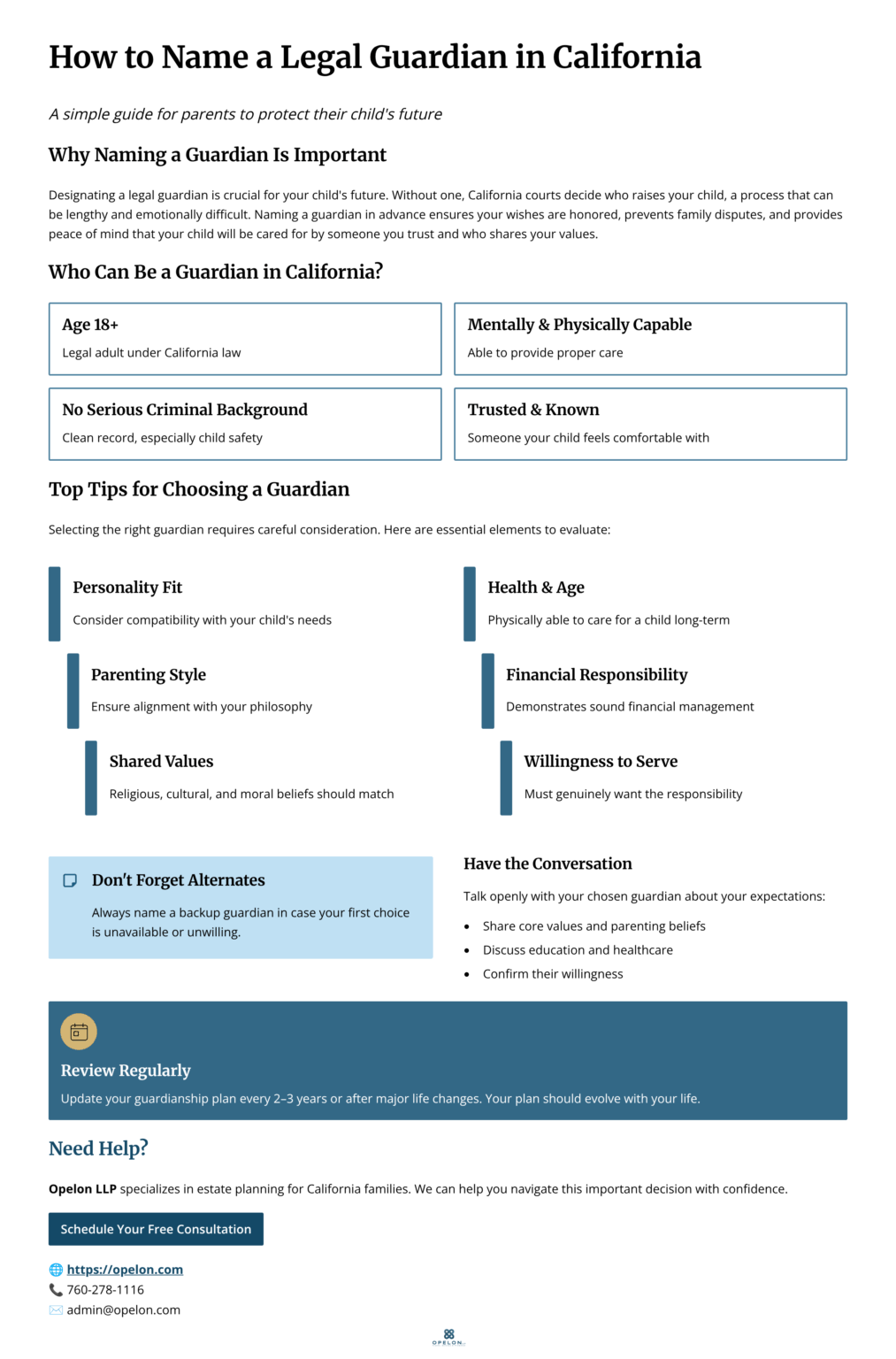Naming a guardian means selecting someone who would raise your children and make legal and personal decisions for them if you’re unable to due to death or incapacity. In California, this decision has significant legal and emotional consequences. A well-thought-out guardianship plan can protect your children’s stability, values, and financial well-being.
This guide explains what naming a guardian means under California law, why it’s critical, how to appoint one legally, and practical tips for making the right choice. You’ll also learn how estate planning tools like wills, trusts, and life insurance can support your guardianship plan.
Why Is Naming a Guardian for Minor Children Critical in California?
For most California parents, naming a guardian ensures that someone they trust will step in if the unthinkable happens. Without this step, the courts will decide who takes over, often without knowing your wishes.
A legal guardian can:
-
Provide consistent emotional support and parenting
-
Make education and healthcare decisions
-
Maintain your child’s living arrangements and routines
Having a clear nomination helps courts apply the “best interest of the child” standard more efficiently and can reduce the chance that your children end up in foster care or with someone you wouldn’t have chosen.
What Happens If You Don’t Name a Guardian in California?
If you don’t nominate a guardian, the court will initiate guardianship proceedings under the California Probate Code. Typically:
-
A judge will evaluate eligible family members or others who petition the court.
-
A temporary guardian may be appointed while a hearing is scheduled.
-
The process can take weeks or months, adding stress during an already traumatic time.
In some situations, children may be temporarily placed in foster care until the court finds a permanent guardian. That’s why a proactive nomination is so important—it significantly reduces uncertainty.
How Does California Probate Law Affect Guardianship Decisions?
California’s laws give judges wide discretion in appointing guardians. Your nomination (in a will or legal form) is not binding, but it is strongly persuasive. Courts weigh:
-
The nominee’s qualifications and relationship to the child
-
The clarity of your nomination documents
-
The presence of alternate nominees
Judges also consider any objections raised by other family members or interested parties. For this reason, legally valid documents and thoughtful backup plans carry real legal and practical weight.
How Do You Legally Appoint a Guardian for Your Child in California?
You can legally appoint a guardian using:
-
A Last Will and Testament – activated upon death.
-
A Living Trust – includes guardianship language and asset management.
-
A Nomination of Guardian form – often used alongside a will or trust.
To be valid, the documents must:
-
Be signed while you are mentally competent
-
Be witnessed or notarized (depending on the document type)
-
Clearly name the guardian and alternate(s)
It’s best to update these documents regularly, especially after life changes like divorce, remarriage, or a move.
What Are the Legal Requirements for Guardian Nomination in California?
To make a valid nomination:
-
You must be at least 18 and mentally competent.
-
The nominee must also be legally eligible (not disqualified due to serious criminal background, etc.).
-
Your documents should include full names, contact info, and a clear order of alternates.
Although courts are not bound to follow your nomination, a well-drafted, witnessed document is highly persuasive, especially when it avoids ambiguity and aligns with the child’s best interests.
8 Key Tips for Choosing the Right Guardian
-
Match Parenting Values: Choose someone whose views on discipline, education, and lifestyle are similar to yours.
-
Location Matters: A guardian who lives nearby can keep your child in familiar surroundings—schools, friends, and community.
-
Financial Stability: While not required to be wealthy, your guardian should manage money well, especially if they’ll oversee your child’s inheritance.
-
Age and Health: A younger guardian may offer longevity, while an older nominee may need a named alternate due to health concerns.
-
Separate Financial and Parenting Roles: In most cases, it’s wise to name one person as guardian and another as trustee to avoid conflicts.
-
Have the Conversation: Confirm your nominee is willing and able to take on the role—don’t assume.
-
Name Backup Guardians: Life happens. Always list alternates in your documents.
-
Review Regularly: Revisit your nomination every few years or after major life events.
How to Evaluate a Guardian’s Values, Parenting Style, and Location
Choosing a guardian is more than a checklist—it’s about finding someone who will raise your child with love, structure, and integrity. To make the right decision:
Ask Yourself:
Does this person reflect the values I want my child to grow up with?
How do they discipline, educate, and nurture?
Would I feel confident if my child grew up to be like them?
Evaluate in Real Life:
Spend time with your nominee and your child together.
Observe how they handle stress, communication, and daily routines.
Consider their proximity to your child’s existing community, school, and extended family.
In most circumstances, guardians who already have a strong bond with your child make the transition smoother and more emotionally secure.
Why Are Financial Stability and Age Important When Choosing a Guardian?
Financial Considerations When Choosing a Guardian
Even if you provide financial support through a trust or insurance, your guardian will manage daily expenses. Someone with stable money habits is more likely to use those resources wisely and reduce stress.
Age and Longevity When Choosing a Guardian
Younger guardians may offer long-term stability, while older individuals might need a backup in case of declining health. Think about the nominee’s ability to raise your child through all stages—elementary through college.
These factors don’t disqualify someone outright, but they should be part of a balanced decision-making process.
How and Why Should You Discuss Guardianship with Potential Nominees?
Start the Conversation with Gratitude
Let them know you trust them and why you’re considering them. This isn’t a small request—it’s a vote of confidence.
What to Cover
Your wishes for parenting style, religion, education, and healthcare
Financial resources and the role of any trustees
Whether they feel comfortable with the responsibility
Get a Clear Answer
Don’t assume someone is willing. Confirm verbally and, ideally, get it in writing. If they have concerns, it’s better to know now so you can plan accordingly.
What Is the Role of Naming Alternate Guardians?
Life is unpredictable. That’s why most estate planning attorneys recommend naming at least two alternates, in case your first choice becomes unavailable.
Best Practices:
List alternates in your will or nomination form with clear order of preference.
Choose people from different stages of life or geographic areas to improve availability.
Talk to each one individually to confirm willingness and understanding of the role.
A well-documented backup plan helps the court follow your wishes, reduces delays, and avoids disputes among family members.
How Can Estate Planning Tools Support Guardianship in California?
Guardianship is about people—but it also involves money. Estate planning tools help ensure that whoever raises your child can afford to do so.
Common Tools Include:
| Tool | Function | Why It Matters |
|---|---|---|
| Life Insurance | Provides quick cash after death | Helps cover immediate expenses, relocation, or education |
| Living Trust | Holds and manages assets | Avoids probate and gives a trustee direct access to funds |
| Pay-on-Death Accounts | Transfers funds to named beneficiaries | Quick access, but less control—usually best for adults only |
For most families, combining a trust (for control) with life insurance (for liquidity) offers both speed and structure.
How Does Funding Guardianship Work Through Life Insurance and Trusts?
How It Works:
You buy a life insurance policy.
You name a trust (not the guardian) as the beneficiary.
The trustee uses the money to pay for the child’s care and needs.
This structure ensures funds are managed responsibly and protects the guardian from financial strain while caring for your child. It also adds a layer of oversight to help prevent misuse.
What Are the Consequences of Not Having a Guardianship Plan in California?
Without a clear plan:
The court will choose your child’s caregiver.
The process may take months and involve family disputes.
Children may be temporarily placed with unfamiliar people or in foster care.
Access to your financial assets may be delayed due to probate.
For most California parents, these risks make a guardianship plan not just a brilliant idea; but an essential one.
FAQ's on Naming a Guardian for Minor Children
What does “naming a guardian” mean in California estate planning?
Naming a guardian in your California estate plan means selecting a trusted adult to care for your minor children if you’re no longer able to. This designation is typically made in a Will or a separate legal document. While a judge has final approval, your choice will strongly influence the court’s decision.
Why is naming a guardian for minor children important for California parents?
For most parents in California, naming a guardian ensures that your child is raised by someone who reflects your values and parenting style. Without this step, the court decides who takes over, which could lead to delays or choices that don’t align with your wishes.
What happens if I don’t name a guardian in California?
If no guardian is named, the court will choose someone based on the child’s best interests. This may lead to unexpected outcomes, including temporary foster care or family disagreements. Having a legal plan helps avoid this uncertainty.
How do I legally appoint a guardian in California?
You appoint a guardian by including your choice in your Will or in a separate legal document like a Nomination of Guardian. The document must be properly signed and meet California’s legal requirements. Once filed, the court will consider your nomination when the time comes.
Can I separate who raises my child and who manages their finances? Answer:
Yes. You can name one person to care for your child (guardian of the person) and another to manage their money (guardian of the estate or trustee). This approach lets you match roles to each person’s strengths and helps ensure your child is supported in all areas.
Are my nomination and Will absolutely binding on California courts?
Not completely. While the court gives great weight to your nomination, it must still approve the guardian. If the court finds your choice unsuitable—for example, due to health issues or criminal history—it can select someone else. Your nomination guides the process but doesn’t guarantee it.
What qualifications does a guardian nominee need in California?
Generally, a guardian must be at least 18, mentally competent, and capable of caring for a child. The court may review their background, health, financial stability, and relationship with your child to determine if they’re a good fit.
Can I name an alternate guardian for my child in California?
Yes, and it’s a good idea. Naming one or more alternate guardians ensures that if your first choice is unavailable, someone you trust is still in place. This gives the court a clear backup plan without delay or confusion.
When should I talk to an estate planning attorney about naming a guardian?
Ideally, you should speak to an estate planning attorney as soon as you have children or if your current plan doesn’t name a guardian. An attorney ensures your documents follow California law and that your nomination is clearly and legally stated.
How often should I revisit my guardianship nomination?
It’s smart to review your guardianship plan every few years or after major life changes—such as a move, divorce, or changes in the guardian’s availability. Keeping your plan current ensures your child is always protected according to your latest wishes.
Conclusion: Secure Your Child’s Future by Naming a Guardian Today
Naming a guardian is one of the most important and loving steps you can take to protect your child’s future. It gives your child stability, reflects your values, and removes uncertainty during a difficult time.
By choosing the right guardian, legally documenting your wishes, and aligning your estate plan with tools like trusts and life insurance, you give your child the best chance at a secure and loving future—even in the worst-case scenario.
Ready to get started? Opelon LLP is here to help San Diego families build legally sound, emotionally thoughtful guardianship plans. Contact us today to schedule a free consultation.
Infographic: Naming a Guardian in California








